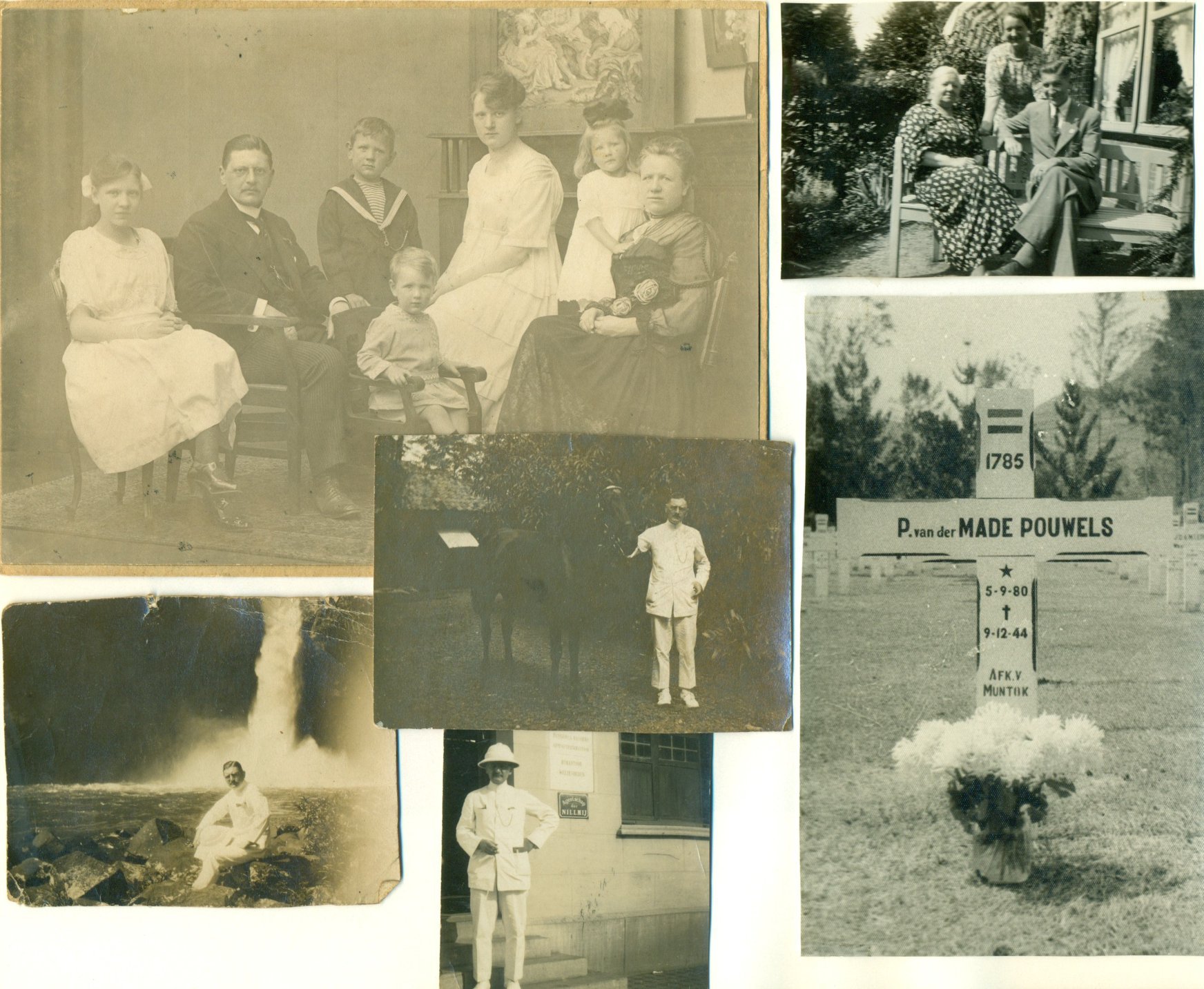While many survived to the 15 August 1945 liberation in the Asian Pacific Theater, my great-grandfather Pieter Pouwels was one casualty among thousands, and died in a prisoner camp on 9 December 1944.
Pieter was imprisoned at Muntok men’s camp, on Bangka Island, a brutal place just off the coast of Palembang, Sumatra, on the tip of remote Banka Island. Muntok was an internment camp for Dutch and Europeans; as a white, Dutch accountant, he was imprisoned with thousands of others who had jobs in business, as educators, lawyers, government employees, hotel owners, and so forth.
As my grandfather Nico describes him, Father Pouwels was known in his community as a warm and generous person, and loved to play games with his children, fly kites, and show kindness to all he knew; he was a cheerful, happy man.
As Japan invaded in 1942, all Europeans were rounded up and forced to live in horrid conditions with little food and forced labor like building railroads through jungles. They were tortured, beaten, and humiliated.
As consistently as Germans documented every move, meticulously recording, photographing, and detailing their madness, the Japanese secretly moved prisoners to various camps to keep their location discreet. With less paperwork to track those prisoners, families might not find proof or contact their imprisoned loved ones, nor have evidence to offer the location of their beloved. Japanese soldiers shuffled Father Pouwels from Java to Palembang along with other men.
One of the nurses in the Palembang camp, Vivian Bullwinkel, was the sole survivor of the Bangka Island Massacre on 16 February 1942. She joined other women who formed a singing chorus under the direction of Margaret Dryburgh. The chorus rallied their spirits in the camp, and has been documented in the book, Song of Survival, by Helen Colijn.
The film, “Paradise Road,” also elaborates on the horrors of the camps and the incredible value and connections they found through singing together.
Eighteen months later, in September 1943, all European men in Palembang were moved, serenaded harmoniously by the women as a gracious farewell, as the men were exiled to the breezy, remote Banka Island and Muntok Camp. Prisoners squeezed tightly onto boats, which took 12 miserable hours to cross the teal-colored Bangka Strait, in choppy, headstrong waters surging against them, like an arm channeling the water in fury, warning them of peril on the island.
From September 1943 onward, Muntok camp, east of Sumatra, served as an assembly location for all European men from Sumatran camps. As the war progressed, it seemed the Japanese preferred more remote locations, with greater difficulty of Allied liberation. They annexed inside the former Muntok prison, a short distance from the island’s rugged, but glorious shoreline of black volcanic rocks and clean sand and clear sea, yet escape was futile at a remote distance from Sumatra.
As an older man of 64 years old, Father Pouwels needed medications, care, and rest, and despite a sturdy constitution he remained susceptible to disease and malnutrition. Infections like dysentery were common in close-quarter camps without proper hygiene.
Prisoners suffered bouts of constant malaria sicknesses — or even “Bangka fever,” a type of cerebral malaria — and beriberi (severe, deadly lack of vitamins and nutrients) and infections, pneumonia, starvation. If those illnesses did not kill them, many were worked to death.
Muntok Camp was not officially liberated until 10 February 1946, long after nearly one third of the Camp’s inhabitants had already lost their lives, including Pouwels. Finally, as the Dutch East Indies was slowly released from Japanese occupation, and the Red Cross informed Nico’s family via telegram of Father Pouwels’ death. Mother Pouwels, living in Amsterdam, grieved deeply for the loss of her husband; their five children, now adults, had hoped and prayed for his rescue.
After the war, Dutch citizens who perished in the Dutch East Indies were buried in the Dutch War Grave Cemetery established for them, and veterans photographed graves for families and mailed them to the Netherlands, for some type of closure from their loved one’s death.
Pieter Pouwels’ grave was in that Banka Island military cemetery and contained a simple white cross with black lettering adorning his neatly-arranged plot:
P. Pouwels
5-9-80
9-12-44
Pieter Pouwels, born 5 September 1880 in Amsterdam, died 9 December 1944 in Muntok. His cross and grave remained peacefully situated in a grassy plain, with green rolling hills behind, verdant landscapes with mango trees and palm plantations, and in the distance, the recalcitrant yet clear emerald sea.
-Adapted from an excerpt from “In Those Other Lands: a WWII novel of survival, hope, and redemption”.




Leave A Comment
You must be logged in to post a comment.